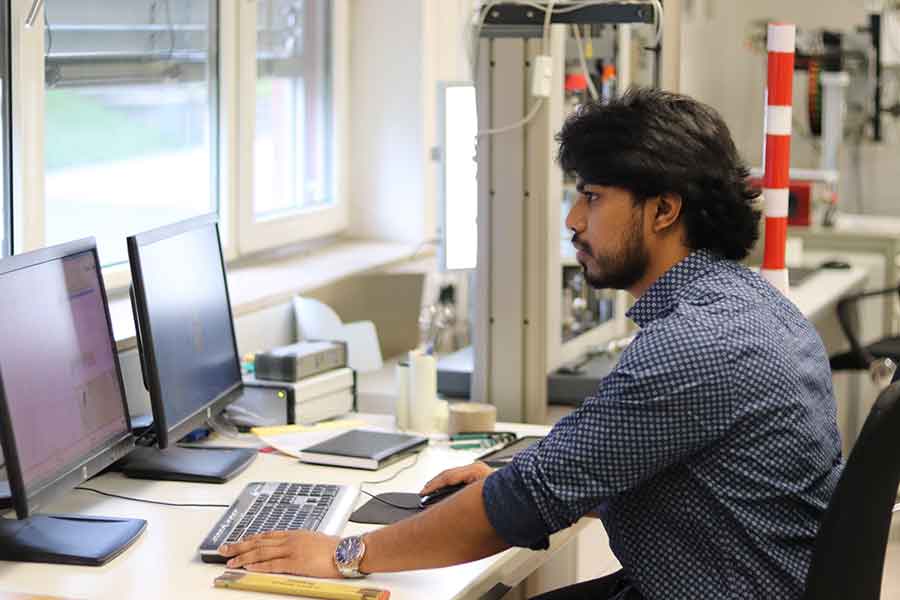In a rapidly evolving job market, the traditional role of the “German expert” is undergoing a transformation. This comprehensive guide aims to equip international job seekers with valuable insights into the changing German work landscape. We explore how lifelong specialization is giving way to cross-functional skills and provide practical advice for those looking to apply for job seekers visas or work abroad in Germany.
Cademix Editorial Board, Cademix Institute of Technology

The Traditional German Experts
For years, the term “German experts” has been synonymous with extreme specialization. Germany has a longstanding tradition of producing highly specialized experts in fields ranging from engineering and healthcare to arts and marketing. An individual would delve deeply into a single area of expertise, often dedicating decades to mastering this niche.
Why Specialization?
The focus on specialization has roots in the German educational system. Early vocational training often sets the stage for a career in a particular field. This approach has led to a high level of expertise and world-renowned quality in various sectors. Specialization wasn’t just encouraged; it was the cornerstone of being a true “German experts.”
The Role of Apprenticeships
Apprenticeships have been integral to this model, blending formal education with practical training. This creates an environment where changing one’s specialty is neither common nor encouraged. For a “German expert,” sticking to one field has been the norm.
Meet Hans, the Engineer: An Anecdote
Let’s consider the story of Hans, a fictional engineer who embodies the traditional German expert. After completing his apprenticeship, Hans joins a reputable German engineering firm. For 20 years, he specializes in hydraulic systems. He becomes the go-to person in this field, enjoying job security and high demand for his expertise. However, as we move further into the 21st century, the requirements of being an expert are beginning to change. Hans senses this shift but feels uncertain about adapting to the new landscape.
Shifting Landscapes
While the traditional model of lifelong specialization has been a hallmark of German expertise, it’s now being reevaluated. In today’s dynamic world, the definition of a “German expert” is expanding. As we move forward, we’ll explore how this traditional concept is evolving. This is crucial knowledge for international job seekers, especially those considering work abroad opportunities or applying for job seekers visas in Germany.
With this background on the traditional German expert, we’ll next delve into how France’s approach to professional expertise differs and what lessons can be drawn from this contrast.

The French Paradigm: Adaptability Over Specialization
In contrast to the German emphasis on lifelong specialization, the French working culture values adaptability and cross-functional skills. A “French expert” often changes roles and gathers experience in different facets of their industry, thus having a wider range of skills compared to their German counterparts.
Job Market: Definition, Measurement, Example
How French Education Influences Expertise
The French education system, particularly at the tertiary level, is designed to provide a broad-based education. Graduates are often generalists who are capable of applying their skills in multiple settings. This feeds into a work culture that values adaptability over hyper-specialization.
The Job-Hopping Culture in France
In France, job-hopping is not frowned upon but often seen as a way to gain varied experience. Many French experts would have worked in different roles in their chosen fields within relatively short time frames. This adaptability is often looked upon as an asset rather than a liability.
Meet Marie, the Designer: An Anecdote
Consider Marie, a fictional French expert in the design industry. Unlike Hans, Marie has moved through various roles within a span of 10 years: from graphic design to UI/UX and even dabbling in project management. Her multi-faceted expertise makes her adaptable and highly sought-after. For Marie, the changing landscape of industry requirements is not a challenge but an opportunity for growth.
Comparing German and French Models
Both the German and French models of expertise have their merits and shortcomings. Germany’s focus on specialization produces experts with deep knowledge in their domain. France’s emphasis on adaptability prepares professionals for the rapidly evolving job market. International job seekers should be aware of these cultural differences when applying for work in either country.

The Global Perspective: Expertise Across Cultures
While our focus has primarily been on the evolving concept of the German expert, it’s important to note that this shift is part of a larger global trend. The contrast between the German and French models of expertise is not unique to Europe; similar dynamics exist around the world. In this section, we’ll explore how expertise is valued in various global contexts, including the United States, Japan, India, Africa, Southern Europe, Canada, Australia, and Iran. These regions have been selected to give a comprehensive view relevant to our diverse audience.
The American Model: Jack of All Trades
In the United States, the career landscape is generally more fluid compared to Germany or France. American experts often embody the ‘Jack of All Trades’ philosophy, having multiple skills across various sectors. While not as specialized as the German experts, nor as job-adaptive as the French, American experts strive for a balanced skill set.
The Japanese Approach: The Hybrid Model
Japan presents an interesting hybrid model. Like Germany, it values lifelong employment but combines this with cross-training within the same organization. A Japanese expert may work in multiple departments over a career but within the same company, resulting in a broad skill set rooted in loyalty to a single organization.
The Indian Scenario: Rapid Up-Skilling
In India, the emphasis is often on rapid up-skilling to meet the demands of an evolving market. Indian experts are often seen acquiring additional qualifications and undergoing training programs to keep pace with industry changes. Their expertise evolves rapidly, albeit sometimes at the expense of deep specialization.
Southern Europe: Similarities with France
Countries like Spain and Italy resemble the French model more closely, emphasizing adaptability and multiple skill sets. A ‘Spanish expert’ or an ‘Italian expert,’ much like their French counterparts, would be someone with a diverse range of experiences.
A Blend of Cultures: Canada and Australia
In countries like Canada and Australia, we see a blend of different cultural attitudes towards expertise. Owing to their multicultural societies, the definition of an ‘expert’ in these countries is more fluid and adaptable, often mixing elements from both the German and French paradigms.
The Iranian Context: A Mix of Tradition and Modernity
In Iran, the concept of expertise blends traditional values with modern requirements. Iranian experts are often highly specialized in their fields, showing a similarity to the German model of deep expertise. However, there’s also a growing emphasis on adaptability, particularly among the younger generation and in tech industries. Similar to the French model, Iranian professionals in these sectors often seek diverse experiences to broaden their skill set. Traditional sectors like engineering and medicine still value deep specialization, while newer fields like information technology and engineering are more open to cross-functional skills.
The African Style of Expertise
Africa, with its rich tapestry of cultures and economies, offers a unique perspective on expertise. Unlike Western models which often focus on specialization or versatility, many African cultures value community-driven expertise. Here, an expert is often someone who can bring people together, solve real-world problems, and contribute to the community. This style of expertise prioritizes interpersonal skills and collective problem-solving. While it might not directly translate to a “German expert,” understanding this community-centric approach can offer valuable insights for international job seekers from Africa aiming to adapt to the German work culture.
The Evolution of the German Expert: Adapting to New Norms
A Multi-Faceted Shift: Navigating Specialization, Versatility, and Startups
The landscape of what constitutes a German expert is undergoing a substantial transformation, affecting various stakeholders in distinct ways. Traditionally, German experts were celebrated for their specialization. However, factors like the advent of Industry 4.0 and the influence of startup culture are shifting the focus toward versatility. Human resources departments are recognizing this trend, updating job descriptions to incorporate a broader skill set alongside specialized skills.
Employers, particularly in the startup ecosystem, are becoming more appreciative of ‘T-shaped’ experts, who bring both depth and breadth to their roles. This change is not merely philosophical but has real-world implications. Job descriptions now often include soft skills like adaptability and communication alongside technical expertise. The change is driven not just by startups but also by the demands of Industry 4.0, which calls for an understanding of automation, data analytics, and even cybersecurity.
International job seekers can find this changing landscape both challenging and confusing. Many have honed highly specialized skills and find themselves suddenly expected to be generalists as well. This new paradigm complicates the recruitment process for human resources departments and creates a disconnect between employer expectations and the skills that international job seekers offer. The result is an ongoing challenge in recruitment, onboarding, and retention of talent.

Adapting to Global Crises and Industry 4.0
Global crises like the COVID-19 pandemic and geopolitical tensions, such as the war in Ukraine, have acted as catalysts in this transformation. These events have heightened the importance of adaptability and multi-disciplinary expertise. HR departments are tasked with the challenging job of drafting contingency plans, making the multi-skilled employee a valued asset in uncertain times. Employers see adaptability not just as a skill but as a necessity for survival in today’s rapidly changing landscape.
The era of Industry 4.0 brings in its wake another set of demands. Companies now expect their employees to be familiar with automation, data analytics, and other modern technologies. The requirement extends not just to engineers or IT specialists but often to roles that were traditionally far removed from these disciplines. As a result, international job seekers who may be experts in older industry standards face the challenge of quickly upskilling to meet these new demands.
Bridging the Gap: Skills and Challenges for the New Age Expert
The widening gap between employer expectations and the skills that international job seekers possess is a significant issue. Organizations find themselves caught in a difficult position, trying to reconcile the changing definitions of expertise with the practicalities of hiring and employee development. For international job seekers, this shift means acquiring a mixture of hard and soft skills has become more crucial than ever. Skills like basic computer literacy, language proficiency, and a rudimentary understanding of management and marketing are fast becoming baseline requirements.
The problem also presents an opportunity for organizations that aim to support job placement, like ours. Bridging this gap is challenging but necessary, offering the potential for innovative solutions in recruitment and training. This new age demands new strategies, and as supporting organizations, we have to rise to the occasion, finding effective ways to align the expectations and skills of both employers and international job seekers.
Actionable Advice for International Job Seekers: Becoming the New-Age German Expert
For international job seekers aiming to become the next “German expert,” understanding the German job market is the crucial first step. While the industrial sector is a stronghold, new growth areas like healthcare, IT, and renewable energy are emerging. Researching your target industry and tailoring your skills accordingly will put you ahead of the competition. HR departments highly value candidates who not only possess specialized skills but also demonstrate a broader understanding of the market trends and business needs.
Language and Soft Skills: The Unspoken Essentials
One can’t stress enough the importance of language skills, especially German, in integrating into the local job market. Even if your workplace primarily uses English, a grasp of German will help you understand work culture nuances and communicate more effectively. But language is just the tip of the iceberg. Soft skills such as adaptability, communication, and teamwork are becoming indispensable, particularly for international job seekers. These skills not only aid in performing your role but also help you navigate the complex dynamics of a culturally diverse workplace.
Upskill to Meet the Market: Online and Onsite Resources
Upskilling has become non-negotiable in the modern job landscape. Platforms like Coursera and LinkedIn Learning offer courses in emerging technologies, management styles, and other essential skills to help you become a well-rounded German expert. Employers increasingly value a mixed skill set that includes both specialized expertise and broader business knowledge. Don’t overlook local workshops and seminars, which offer not only skills but also valuable networking opportunities.
Visa Navigation: Know Before You Go
A thorough understanding of visa requirements is essential for a seamless transition into the German job market. Whether it’s the Job Seeker Visa or the EU Blue Card, knowing your options and preparing in advance can make the application process much smoother. Human resources departments often appreciate candidates who have done their homework, as it simplifies the onboarding process and sets the tone for a proactive work ethic.

Ten Actionable Tips for International Job Seekers
- Tailor Your Resume: Customize your CV to highlight the skills most relevant to your target industry in Germany.
- Learn Basic German: Even a beginner’s level can make a difference in how you are perceived.
- Network: Use platforms like LinkedIn to connect with professionals in your industry.
- Cultural Sensitivity: Familiarize yourself with German work culture to avoid misunderstandings.
- Consult Local Resources: Check local job boards and connect with employment agencies specialized in your field.
- Join Webinars: Keep an eye out for industry-specific webinars or online events that can provide valuable insights.
- Find a Mentor: A mentor can provide personalized guidance and open doors you didn’t know existed.
- Apply for Acceleration Programs: Programs like our Cademix Career Acceleration Program or continuing education (Weiterbildung) can provide comprehensive support and guidance.
- Stay Updated: Follow industry trends and news to keep your knowledge current.
- Seek Organizational Support: Lean on organizations designed to help international job seekers for both logistical and emotional support.
Each of these tips offers a concrete step toward becoming the kind of versatile, adaptable German expert that employers are increasingly seeking. Whether you’re navigating the complexities of visa requirements or upskilling to meet the demands of Industry 4.0, these actionable insights aim to prepare you for a successful career in Germany.
Do you want to find more about Enhancing User Search Behavior Understanding Through Reflective Search Intent? Click here.
Concluding Insights and Resources: Navigating the Future Landscape of Expertise
The landscape of what it means to be a “German expert” is changing. Traditional models of deep specialization are evolving to include broader, cross-functional skills. For international job seekers, this means it’s more important than ever to be versatile and adaptable.
For those looking to delve deeper into this subject, several resources can offer more insights. Websites like Make it in Germany provide comprehensive guides for international job seekers. Online platforms such as LinkedIn can be powerful tools for networking and job searching. Don’t forget to check out blogs and webinars that specifically focus on the German job market.
Networking Opportunities and Navigating Cultural Differences
Beyond online resources, remember that personal connections can be just as valuable. Consider attending industry-specific events or meetups to expand your professional network in Germany. Sites like Meetup.com often list events aimed at expats and international job seekers.
Each country has its own unique work culture, and Germany is no exception. Learning to navigate these cultural nuances can make your transition much smoother. When in doubt, seek advice from those who have successfully integrated into the German job market.

The Role of Mentorship and Acceleration Programs
In a constantly evolving job market, guidance from an experienced mentor can be invaluable. Having a mentor offers you the unique advantage of individualized advice and insights that you can’t get from general resources. Whether it’s navigating the cultural nuances of working in Germany or strategizing your career advancement, a mentor’s support can provide a crucial edge.
Beyond individual mentorship, joining a structured acceleration program like the Cademix Career Acceleration Program can amplify your career growth exponentially. Programs like these are specifically designed to offer organizational support at various levels—skills enhancement, network building, resume polishing, and much more. Not only do they provide tailored training and workshops, but they also facilitate real-world opportunities to apply what you’ve learned, bridging the gap between theory and practice.
The benefit of such programs is multi-dimensional. Apart from technical skills and know-how, you receive emotional and psychological support that often proves to be crucial in challenging or transitional phases of your career. So, for anyone serious about becoming a new-age “German expert,” or simply wanting to excel in their field, the support of a mentor and the structured path provided by an acceleration program can make all the difference.
Embracing Change: The Future of the German Expert
In this rapidly evolving world, change is the only constant. The German expert of yester-years, celebrated for deep specialization, is metamorphosing to meet the diverse demands of today’s interconnected, multidisciplinary landscape. The global crises, technological revolutions, and a shift in work paradigms have been instrumental in reshaping the definition of expertise in Germany.
For international job seekers, this means a golden opportunity. By broadening skill sets, understanding the cultural nuances, and proactively navigating the intricacies of the German job market, one can position oneself at the forefront of this transformation.
As borders blur in an increasingly digital world, the essence of being an expert is less about geographical confines and more about adaptability, continuous learning, and the ability to wear multiple hats. The future belongs to those willing to evolve, learn, and grow. In the context of the German job market, this translates to embracing a wider skill set while respecting the roots of deep specialization that the country is renowned for.
Whether you’re from the arts, engineering, healthcare, or any other field, the message is clear: The new age German expert is not just a specialist, but a versatile professional ready to take on the multifaceted challenges of tomorrow.

